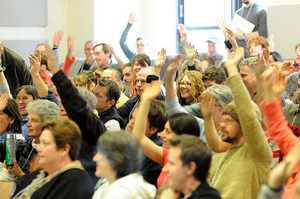A full day at HomeGrown Local Food Summit

Over 200 people attended the HomeGrown Local Food Summit at U of M's School of Natural Resources & the Environment.
Photo by Dave Brenner, School of Natural Resources & the Environment
According to Jason Frenzel, longtime member of the HomeGrown Steering Committee, the desired outcome for the summit could have been nothing but vast and powerful. “The goal of today is to come to an understanding of what the next phase of the local food movement is going to be. We will have a lot of different discussions and go through a lot of different processes to figure that out today.”
The energy was high from the very beginning, with Frenzel asking questions and the crowd responding with laughter, cheers, and raised hands.
“Give out a whoop if you GROW food!." "Raise your hand if you EAT food!"
The energy continued with Kim Bayer, president of Slow Food Huron Valley, presenting a slideshow of local food victories in 2009. These are victories for all of us.
2009 - Local Food Victories! Guaranteed to make your head spin and your heart full.

Courtesy of Preserving Traditions
- Dick’s Pretty Good Garlic: Over 40 varieties of garlic being grown in a new farm.
- Legacy Land Conservancy: Saved 290 acres of land and 186 acres of farmland (and has been preserving land for decades).
- 5,000 people attended the second annual HomeGrown Festival.
- Food System Economic Partnership: Farm to School Program.
- Edible Avalon: Vegetable gardens thriving in the Avalon Housing communities.
- WCBN: 88.3 FM discussing local food issues.
- Preserving Traditions: Logo “Yes we Can” shown under a mason jar.
- FridayMornings@Selmas: Raised over $50k for small farms initiatives.
- Living Stones Community: Gardening with former prisoners.
- Community Gardens thriving under the auspices of Growing Hope and Project Grow
- Food Gatherers: Doing such good work always.
- Faith and Food Initiative
- Chelsea Community Kitchen
- Yellow Door Community Kitchen
- Brines Farm: Launching the first winter CSA for fresh greens.
- Inchworm Microgreens: Brian Steinberg’s “newest and smallest farm” sprouting greens in trays.
- Ann Arbor Farmers Market accepting Bridge Cards
- Sunseed Farm: Hoophouse built with funds raised from FM@Selmas and they are offering CSAs for 48 weeks out of the year!
WHEW! I would also add to this list my personal favorite, the City of Ann Arbor changed zoning rules in order to make the Westside Farmers Market legal (yippie!).
Jeff McCabe then stood up to speak about the 10% Campaign, and his data was compelling. “In Washtenaw county, we spend over $1 billion a year on food…less than one percent of those purchases are grown in the county…growing 10 percent of our food would result in over $90 million in new direct economic activity and increased community security.”
At this point we broke into small groups to work on a slogan or a brand for such an initiative.
And the results were awesome:
“Keep it Local: Eat ten for your town!” “You drive a Michigan car, now eat Michigan food.” “Add 2 [meals a week] get 10 [percent]” “Ten [locally sourced meals a month] tastes great!” “Eat 2 [locally sourced meals a week] for you!” “Produce, Prepare, Prosper.”
Buoyed by the creativity and intelligence of our fellow participants, we broke out again into action groups focusing on the many facets of the local food hydra: education, infrastructure, inclusivity, management, resources, transportation and policy, among others. Each group worked on short-term and long-term ideas to improve a facet of that issue. My group was public outreach, and we centered our discussions on how to raise awareness of the local farmer’s markets. Ideas ranged from bicycle deliveries from the market to food preparation tips and guides.
Regrouping for a delicious meal by A Knife’s Work the day continued.
Smaller group workshops continued throughout the rest of the afternoon. From a dizzying array of choices (Beekeeping, Wildcrafting, Backyard Mushrooms, Farm to School, Local Food Distribution) I chose social media, where we spoke about the role of social media in raising awareness and improving distribution. Then I went to a workshop with Jennifer Fike of FSEP to hear about the Michigan Charter being worked on at the Michigan Good Food Summit to use as a template for Lansing discussions (you can read it on their Web site under “Draft Work Group Agenda Priorities”).
I started out the day talking to John Harnois about 13 frozen heritage turkeys in his freezer leftover from Thanksgiving and his concern about finding a market. Right then Chef Brandon Johns, of the Grange Kitchen & Bar, walked by and said that he might be able to take “a few." I ended the day sitting next to Dick Dyer, of Pretty Good Garlic, talking about the offers he had received from local restaurants to purchase his garlic. "I met so many people today, isn't this great?"
It appears I was not the only one making vast and powerful new connections and left feeling full of possibility and choices.


Comments
Moms Kitchen
Fri, Mar 5, 2010 : 10:51 a.m.
Harnois farm isn't in Milan, it's in Webster Twp., near Dexter: http://www.harnoisfarms.com/ Good to meet you at the Homegrown Festival
Adam Jaskiewicz
Wed, Mar 3, 2010 : 6:06 p.m.
I usually buy Michigan beer, eggs, and milk, and I take advantage of local fruits and veggies when they're in season. The coffee I buy is locally-roasted, but of course nobody grows coffee in Michigan. However, if I'm really craving something that just isn't available locally, I don't have a problem eating it. Just like I wouldn't have a problem buying a Japanese car if that's what met my needs. My Cherokee only has 150,000 miles on it, though, so I've got another few years yet before I'm in the market for a new (well, used; new to me) car.
Adam Jaskiewicz
Wed, Mar 3, 2010 : 5:46 p.m.
Prosciutto is an Italian dry-cured ham. It's not smoked like most American hams, and has a nice musty flavor. There are some American imitations, but they aren't very good. A lot cheaper than the real thing, though, so I use the stuff sometimes depending what I'm doing with it. I don't know of any sources of a similar product locally. Pecorino Romano is a hard Italian sheeps' milk cheese. American "Romano" cheese is usually made with cows' milk, and isn't aged as much, so it really doesn't taste anything alike. And it's from Wisconsin, anyway. Closer than Sardinia, but still not local. Carmenere is a variety of grape. There are some really good, reasonably-priced wines from Chile made from it.
tdw
Wed, Mar 3, 2010 : 5:02 p.m.
Adam I know what olive oil is, but whats that other stuff?
Adam Jaskiewicz
Wed, Mar 3, 2010 : 4:57 p.m.
How local is local? Washtenaw County? Southeast Michigan? Do we include Ohio? And locally-grown/produced tomatoes, eggs, milk, apples, and lettuce are all well and good, but I can't go totally local unless I give up things like olive oil, pecorino, prosciutto, and carmenere, and that isn't gonna happen.
tdw
Wed, Mar 3, 2010 : 3:41 p.m.
Personaly I could care less about buying local.I do however,plan on plantig a garden maybe 20x40 this year.The food just tastes better.Can I sell the excess?
Adam Jaskiewicz
Wed, Mar 3, 2010 : 3:15 p.m.
There aren't too many choices for cars built in Michigan. Mine was built in Ohio, but Jeep was owned by Daimler when it was built so I guess it's a German car?
Patrick
Wed, Mar 3, 2010 : 1:38 p.m.
Laugh all you want Alan. The average American family of 4 spends $1,200/month on food and $400/month on their cars. Why can you insult someone who drives a foreign car if you are eating crappy processed food from outside the state? Supporting local food producers allows for 100% of your $ to go to the local economy, to be spent, in most cases, 100% in the local economy... Instead of being facetious, why don't you try re-investing more of your $'s in buying local food?